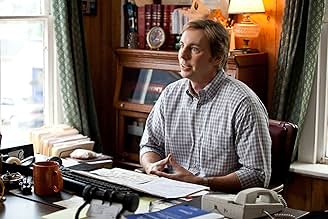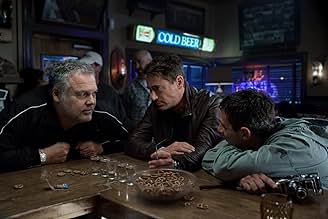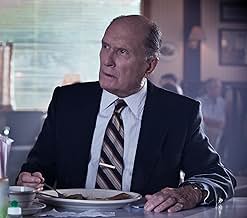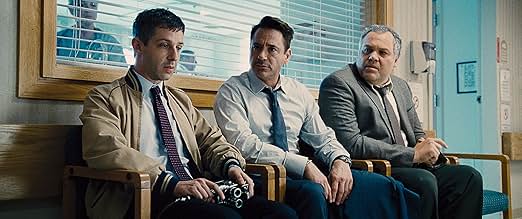O advogado Hank Palmer, retorna à casa da sua infância, onde seu pai, o juiz da cidade, é suspeito de assassinato. Hank parte para descobrir a verdade e, ao longo do caminho, se reconecta co... Ler tudoO advogado Hank Palmer, retorna à casa da sua infância, onde seu pai, o juiz da cidade, é suspeito de assassinato. Hank parte para descobrir a verdade e, ao longo do caminho, se reconecta com sua família distante.O advogado Hank Palmer, retorna à casa da sua infância, onde seu pai, o juiz da cidade, é suspeito de assassinato. Hank parte para descobrir a verdade e, ao longo do caminho, se reconecta com sua família distante.
- Direção
- Roteiristas
- Artistas
- Indicado a 1 Oscar
- 3 vitórias e 10 indicações no total
Avaliações em destaque
The film concerns Hank Palmer (Robert Downey, Jr.), an immensely successful, arrogant Chicago lawyer, who returns to his hometown of Carlinville, Indiana for his mother's funeral, leaving behind an unsatisfied wife who wants out of their marriage and a young daughter who knows a bit too much for her age. Upon returning to Carlinville, Hank reconnects with his two siblings and realizes all the reasons him and his father, Judge Joseph Palmer (Robert Duvall), have severed all ties to each other. Hank detests his father for not just his stubborn and sometimes vague natures, but his crooked sensibilities that often come off as brash and inhuman.
Hank realizes he'll have to extend his stay in Carlinville when his father is suspected of murdering a man he sent to prison some years ago. After a long, emotional night at his wife's funeral, Joseph wakes up to find his car scratched with blood in the front-grill that matches the blood of the victim he hit, who was riding on the street on a bicycle. After being granted the ability by Joseph, Hank now has to go about defending his father, as he is up against the equally-renowned prosecutor Dwight Dickham (Billy Bob Thornton).
I cannot proceed further into analysis until I recognize the beauty of Downey, Jr. and Duvall's chemistry and their individual performances. Both actors convey such a natural feeling of stubbornness and gusto that, when both men are in the room together, often occupied by tense arguing or bickering, "The Judge" electrifies the audience. Downey, Jr., even as he nears fifty, occupies the sensibilities and the mindset of a cocky frat boy in the best possible way, and Duvall, in his early-eighties, finds commendable energy in his role as the judge-turned-convict. When put together and given personalities that the men can convey in their sleep (Downey Jr.'s cocky, holier-than- thou attitude and Duvall's all-knowing attitude but occasionally vague intentions), the film explodes on screen.
Then there's the man who is likely going to get little praise, due to his minimal involvement until the final act of the film, Billy Bob Thornton, doing the best Billy Bob Thornton performance possible. You know the type: confident, but not foolishly cocky, well-spoken, with a humble southern drawl, and groomed but mannered method to his madness. Right off the bat, we have three incredible talents gracing the screen at one time, which almost makes us forget how average and often cluttered the story really is.
"The Judge" suffers from the classic issue of having too many subplots. In my plot summation, I mentioned two (the divorce and the murder trial), yet that doesn't even scratch the film's surface of how many bases it attempts to hit. Aside from trying to play up the "father never loved me" storyline, "The Judge" attempts to build so much around the life of Hank that it can't keep up. We have a divorce, the rekindling of an old relationship, a possible deadbeat dad situation, a vague future, and that's not even considering the subplots and other features plaguing the other characters, like Joseph and his other two sons. There is simply too much occurring in "The Judge" to effectively appreciate everything it has to offer.
Then there's the fact that the courtroom scenes of the film, unlike in "Flight," back in 2012, which proved not to be something they were ostracized as prior to the film's release, which find themselves too lost in the affinity of theatricalities rather than realism. By this point, the whole film has taken a realistic, human focus to its story, and to see "The Judge" take on brazen obviousness in the way of courtroom shouting and disobedience finds ways to be offputting at times.
Nonetheless, "The Judge" is, above all, an audience's film, meaning that most people who go to see this film will, in turn, love it, and find themselves reflecting on life, their family, and themselves. I'd be lying if I said this film didn't hit personal chords, depicting a troubled relationship between father-and-son that I have encountered in life countless times, with attitudes and stances greatly mirroring my own reality. For this reason, among the fact that the film's performances are truly something to take in and the film's human interest never loses sight despite a heavy dependence on storyline, I'm recommending "The Judge" to people as a solid piece of adult drama with a modern, human focus; we hardly ever get those anymore by someone who's name isn't Alexander Payne.
I found this to be a better film than Gone Girl. It is more believable and more moving.
I am a baby boomer who likes science fiction but I am quite pleased to see a film without a super hero and CG images.
I hope to convince my daughters (all in their 20's) and my parents (in their 80's) to see this movie.
Robert Downey, Jr. plays Duvall's estranged son, a very successful Chicago criminal attorney who gets a call from his brother Vincent D'Onofrio that their mother has just passed on. Right in mid trial he gets a postponement and flies to the small Indiana town where he grew up to be with his brothers and dad.
While still in mourning a man is run down by a car identified as Duvall's and he's arrested. Turns out to be a man he gave a break to in his court who came back and pulled a horrible crime. He'll need a good lawyer, but Duvall won't make the obvious choice.
There's a whole lot issues separating Duvall and Downey making a gulf as wide as the Pacific Ocean. As he proudly points out Downey commands some big fees in Chicago. My favorite scene in the film is Duvall insisting that local attorney Dax Sheppard be his lawyer. Sheppard is a part time lawyer and a full time antique dealer who got his law degree at a school Valparaiso, Chile, good old Valpo as he calls it. Downey is beside himself at this guy's incompetence.
Grace Zabriskie has a short but memorable performance as the mother of the man who was killed. Years of rage and hate come out at Duvall. As Downey points out when you're a town judge like that for 35 years you will make rulings and have a lot of people you ruled against hate you. In fact as we meet Duvall there's a great example of that when he orders this redneck deadbeat to cough up child support by giving title to his brand new truck over to his esteemed wife so she can sell it. In that world that's like ordering castration. You will make enemies with decisions like that. It kind of makes you wonder about all those old Andy Hardy movies where Lewis Stone was beloved by all in Carvel.
Downey and Duvall have a special dynamic working in The Judge. Their last scene together is exponentially poignant.
A whole lot of family dirt is exposed when the rug is lifted in The Judge. For fans of both Downey and Duvall this is a must.
Not a simple courtroom drama at all, the story is more about Hank Palmer (Downey)'s struggle to understand his relationship with his father and to accept where he came from. It's about identity, family, and all the messiness and contradictions of life.
If you are a teenager who can't sit still through a more-than-two-hours long movie, or expect some type of John Grisham or Iron Man-like action from this film, you will be disappointed. If you are a true film lover who revels in watching great actors practice their craft, you will not be disappointed by The Judge.
This movie is definitely worth sitting through for amazing performances by both Downey and Duvall, who could both be up for Oscar nominations for their roles as the son and father, respectively. There are many very funny moments as well as many touching moments between father and son, brother and brother. The audience I sat with at Roy Thomson Hall loved it, frequently expressing their appreciation with laughter. See for yourself on October 10--don't let a few critics spoil it for you.
Você sabia?
- CuriosidadesSomeone rhetorically mentions Atticus Finch, a reference to O Sol é para Todos (1962), which was Robert Duvall's screen debut, playing Arthur "Boo" Radley.
- Erros de gravaçãoWhen Hank asks the Judge on the stand, "What would happen to all the cases you've presided over in the last six months if it were determined that your mental actuality were diminished?" The word that Hand was looking for was, "acuity." Actuality means the actual existence, where acuity means sharpness or keenness of thought.
- Citações
Hank Palmer: Everyone wants Atticus Finch until there's a dead hooker in a bathtub.
[Note: Atticus Finch is the lawyer in "To Kill a Mockingbird."]
- Trilhas sonorasWell Sweep Out The Ashes (In The Morning)
Written by Joyce Allsup
Performed by Gram Parsons
Courtesy of Reprise Records
By arrangement with Warner Music Group Film & TV Licensing
Principais escolhas
- How long is The Judge?Fornecido pela Alexa
Detalhes
- Data de lançamento
- País de origem
- Centrais de atendimento oficiais
- Idioma
- Também conhecido como
- El juez
- Locações de filme
- Plymouth County Courthouse, Plymouth, Massachusetts, EUA(Opening Courtroom Scene)
- Empresas de produção
- Consulte mais créditos da empresa na IMDbPro
Bilheteria
- Orçamento
- US$ 50.000.000 (estimativa)
- Faturamento bruto nos EUA e Canadá
- US$ 47.119.388
- Fim de semana de estreia nos EUA e Canadá
- US$ 13.116.226
- 12 de out. de 2014
- Faturamento bruto mundial
- US$ 84.419.388
- Tempo de duração2 horas 21 minutos
- Cor
- Mixagem de som
- Proporção
- 2.35 : 1











































